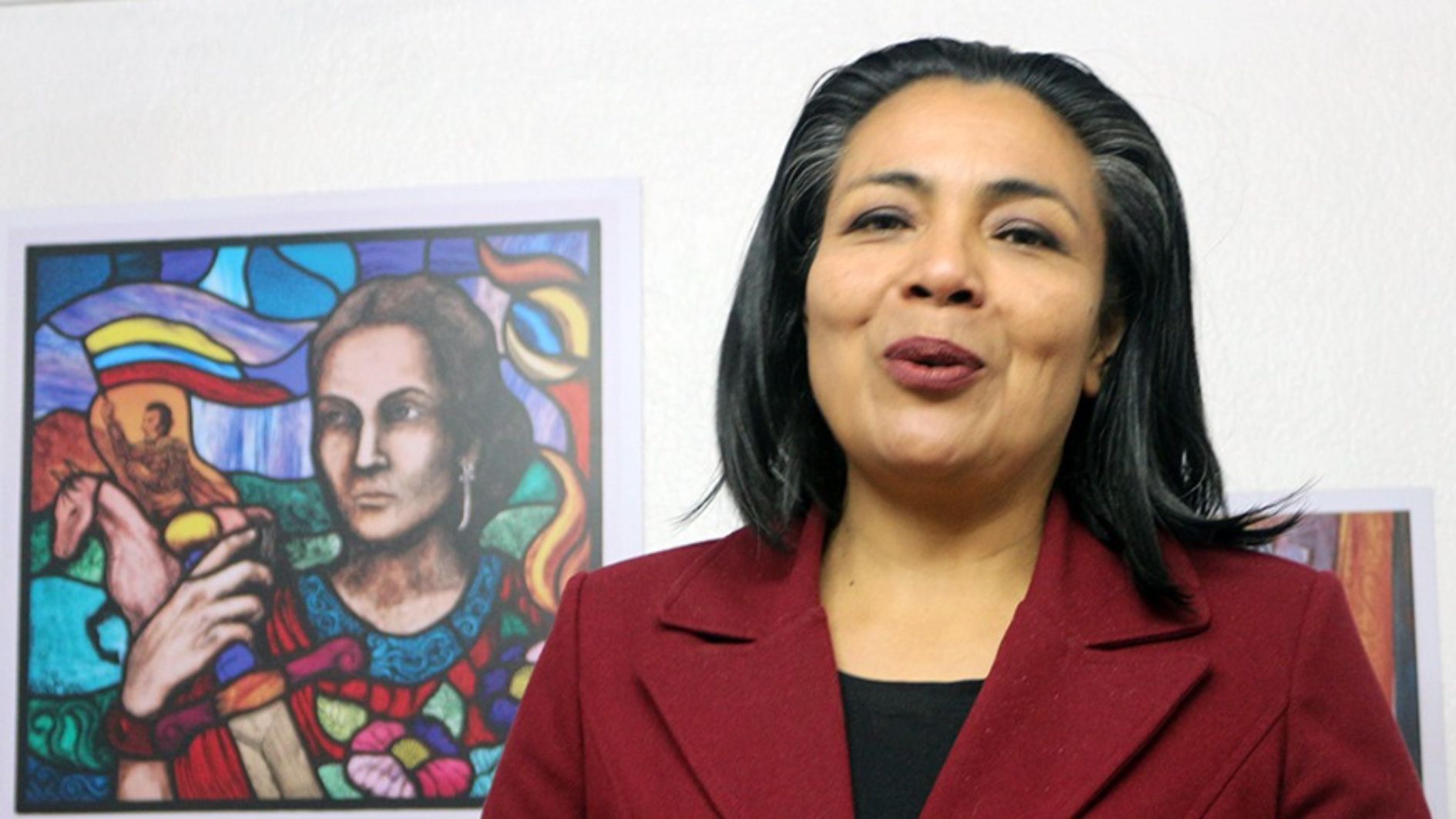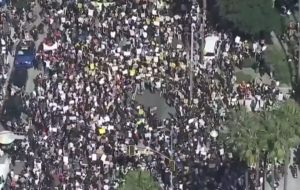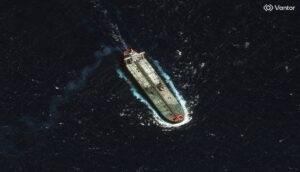
Published 12/09/2024 10:26 | Edited 12/09/2024 14:14
“The first norms approved by Noboa were the implementation of the neoliberal agenda for privatization, the adoption of Free Trade Agreements (TLCs) and regressive taxes – which harm the poorest –, with an increase of 12 to 15% in sales tax rate”, denounced Marcela Arellano Villa, president of the Unitary Federation of Workers (FUT) and the Ecuadorian Confederation of Free Trade Union Organizations (Ceosl).
In this exclusive interview, Marcela stated that Daniel Noboa, president of Ecuador, has only demonstrated competence in protecting and multiplying the interests of his family and transnational agro-industrial and mining capital”.
In order for the country to grow again, the union leader proposes the “composition of a broad front to put an end to the cycle of blackouts lasting up to 14 hours, wage cuts, unemployment and extreme violence” that affects the South American country.
Follow the interview below.
Mega-businessman Daniel Noboa assumed the presidency of Ecuador in a buffer term of one and a half years, in November 2023, which to date has been characterized by increasing blackouts, unemployment and violence. In your opinion, what is Noboa’s main brand?
Firstly, it is necessary to evaluate the context in which Ecuador found itself. President Noboa has already taken office in a context of violence – where violent deaths have soared from six per 100,000 inhabitants in 2018 to 47 per 100,000 in 2023 –, placing the country on the list of the ten with the highest incidence of crimes worldwide.
The crisis of violence destabilizes Guillerme Lasso’s government and forces him to resign, which practically leads to the process of “cross death” – with new presidential and legislative elections. On January 7, 2024, the country ends up in an exacerbated situation of atrocities. On this day, a group of criminals took over the media, even spreading bombs in cities like Quito and Guayaquil, leaving the scene quite complex.
Furthermore, since last year, our country had already been affected by the energy crisis. Industry experts had announced with studies and projections that the situation would worsen. In this context, Noboa arrives and uses both the security crisis and the energy crisis to deepen the neoliberal agenda.
And what have you achieved so far? He managed to ensure that the first norms approved by him were precisely the implementation of the neoliberal agenda for privatization, the adoption of Free Trade Agreements (TLCs) and regressive taxes – which harm the poorest –, with the addition of 12 to 15 % at the Sales Tax (ICMS) rate under the pretext that these 3% would be applied to combat insecurity. This money would go to the police and their “Phoenix Plan”, which in our understanding never existed because it never brought any concrete results, never affected the leaders of organized crime. Proof of this is that there continues to be a prison crisis, without any measure to take care of people’s lives; small and micro businesses continue to be robbed by criminals. In fact, extortion by these mafias has grown, which not only affects traders, but even those who earn a little more and have had to pay bribes to criminals. In other words, the government has done absolutely nothing!
The only thing that has regrettably advanced are these regressive, neoliberal measures, such as the privatization of the energy sector and the increase in VAT, meaning that the purchasing capacity of salaries has been brutally reduced. By affecting direct and indirect jobs, the energy crisis has impacted the precariousness of work relationships.
In April 2024, you denounced that, through a Popular Consultation, “Noboa tried to surrender the country to the modern slavery of neoliberalism”, but, instead, “the population went to the polls and ratified national sovereignty, making it clear that the government lied.” What does this step mean?
The government attempted to implement a regressive labor reform through a Popular Consultation with most of the questions on security, but which incorporated two questions regarding the constitutional reform to allow hourly work and the fixed-rate contract. fixed term. He said that these measures were necessary to obtain foreign investment. There was another one about international arbitration – placing the noose around the neck of our sovereignty, subjecting the country to transnational corporations and their lobbyists. Fortunately, 70% of the Ecuadorian population said no to the government, which lost the centrality of its Consultation.
Despite this, labor flexibility measures have accelerated, with the Ministry of Labor beginning an attack on trade union organization and we are now at a time of aggression and persecution of leaders. We continue to face insecurity problems and experience blackouts of up to 14 hours a day, causing a series of difficulties. It is an absolutely inefficient government with no interest in the rights or solving problems of Ecuadorians.
You have stated that the Noboa government likes to fish in “rio revuelto” (in murky waters), benefiting your family. How does this happen?
His multimillionaire family’s business has grown with the implementation of Free Trade Agreements that expand agro-industrial and mining borders. And when they are interested, the government continues to move forward… And it continues to negotiate FTAs with the United States and Canada, with its back to the workers and our people as a whole. Therefore, it is a government incapable of implementing measures to protect rights and life, but tremendously competent to protect and multiply both the interests of its family and those of transnational agro-industrial and mining capital.
I cite as an example the hydroelectric plants put up for auction. The facilities of one of them were handed over to the Glória group, which comes from Peru [onde foi revelado que financiou a campanha milionária de Keiko Fujimori, anos depois de colaborar com o governo ditatorial de seu pai, Alberto]is linked to a food cartel [forçado pela França a retirar do mercado produtos lácteos contaminados por salmonela].
From the point of view of the union organization, how do you see the composition of a broad front to defeat the current misgovernment in the next elections in February 2025?
What we are doing right now is increasing mobilization capacity, acting on both the national and international scene. We denounced at the Conference of the International Labor Organization (ILO) and in other instances what is happening with the implementation of neoliberal policy and union persecution. In June this year, in the 112th section of the ILO, Ecuador was added to the list of the worst countries for workers, due to the constant attacks on freedom of association. This was the result of the action of the Workers’ Unitary Front and, naturally, of our Ecuadorian Confederation.
It is a scenario that we are denouncing, focusing on chapters such as chapter nine of the FTA with the European Union, in which we point out the need to defend labor rights and the environment. Whether through complaints or documents, we act to pressure and force the Ecuadorian government to comply with its obligations and respect rights.
On the internal side, first we can say that we are dialoguing with other organizations and movements with the aim of consolidating a strong force. Isolated, the union movement cannot face everything that Noboa’s power means.
Noboa was not only able to control the Constituent Assembly, but the media, implementing a state of exception, in which he has permanently maintained the country, preventing large demonstrations from taking place, precisely because of the fear of people. This is what makes the Government Minister, the Minister of the Interior and the other generals come out and make statements that mobilizations will not be allowed. Isolated, the union movement is unable to face the armed public force called upon to intimidate and persecute.
Despite everything, in the Popular Consultation, the influence of the union and popular movement defeated the entire state apparatus and all media campaigns. We defeated the media narrative, we imposed a defeat on the backlash, managing to fight the battle on the streets and also on social media.
Given this, how important is it to build a communication network that meets the interests of development with sovereignty, strengthening the integration of our countries and peoples?
MA – We need a communication strategy that addresses this scenario built by the mainstream media, adding us to social networks that allow us to break the blockade built by authoritarian governments like the current one, which prevent us from accessing the media.
Censorship occurs so that the reality and dimension of the crisis in which we are immersed is not known beyond the border. That is why it is essential that we have instruments in Brazil such as Hora do Povo, the RedDiálogos do Sul, Correio da Cidadania and ComunicaSul. These are independent means that exist to sustain solidarity and take our people’s struggle further with an integrationist commitment.
Source: vermelho.org.br

